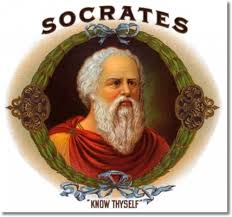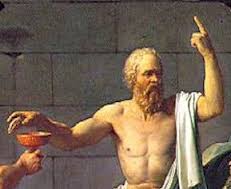 Socrates was a familiar figure in Athens. Shabbily dressed and always barefoot, even in winter, he spent his days discussing everything under the sun with all and sundry. He was soon regarded as the wisest man in Athens, even though the city was full of philosophers who charged money for teaching. This flattery did not impress Socrates. He listened to an inner voice, which stopped him doing things for selfish reasons. He said, “The only thing I know is that I know nothing.” He also said: “Ignorance is the only evil.“
Socrates was a familiar figure in Athens. Shabbily dressed and always barefoot, even in winter, he spent his days discussing everything under the sun with all and sundry. He was soon regarded as the wisest man in Athens, even though the city was full of philosophers who charged money for teaching. This flattery did not impress Socrates. He listened to an inner voice, which stopped him doing things for selfish reasons. He said, “The only thing I know is that I know nothing.” He also said: “Ignorance is the only evil.“Socrates was not the first philosopher in the West. However, his importance for Western philosophy can be gauged by the fact that the early Greeks who preceded him are known as the Pre-Socratics, meaning “before Socrates”.
Socrates believed that happiness came from leading a good life. What is good and what is bad? this was the big question. Socrates thought he might find out if he talked to enough people. The more questions he asked, the more he would know, and knowledge was the one thing he was sure was good. But his challenging questions got him into trouble. Some of Athens’leading political figures did not take kindly to having their opinions reduced to tatters.
 Socrates saw himself as a horsefly , stinging Athens to life. He protested in political matters and made some powerful enemies. He was arrested and accused of corrupting young minds and worshipping false gods. He was found guilty on both charges and sentenced to death by drinking poisonous hemlock. His accusers expected him to beg for his life. their real intention was to take this colourful character down a peg or two. Under Athenian law, Socrates had the chance to suggest a different punishment. But he refused to grovel. Instead, he proposed that the city should give him one free meal a day and erect a statue of himself in the market place. The court was not amused and ordered the death sentence to be carried out.
Socrates saw himself as a horsefly , stinging Athens to life. He protested in political matters and made some powerful enemies. He was arrested and accused of corrupting young minds and worshipping false gods. He was found guilty on both charges and sentenced to death by drinking poisonous hemlock. His accusers expected him to beg for his life. their real intention was to take this colourful character down a peg or two. Under Athenian law, Socrates had the chance to suggest a different punishment. But he refused to grovel. Instead, he proposed that the city should give him one free meal a day and erect a statue of himself in the market place. The court was not amused and ordered the death sentence to be carried out.Socrates is a bit of a mystery figure. He wrote no books. Most of what is known about him comes from his student Plato. The fact that Socrates died for his beliefs was an inspiration to all those later philosophers who have dared the challenge the status quo. Socrates was different from the ancient Greeks before him in that his concern was morality, or what was good, rather than what glued together the physical universe.
Socrates wanted to find universal definitions for ideas such as good, justice, and wisdom rather than just descriptions. He thought that there must be some common denominator, in each of these abstract ideas. He knew that by being able to describe, for example, an act of courage, people must be able to recognize the essence of that courage within that act. His quest was to isolate that essence.
Socrates’ method of finding the truth about things was a system of questioning people’s beliefs. through this he hoped to revealed inconsistencies. He thought that the truth could only be found with a lot of hard work. The most influential group of philosophers at the time of Socrates was the Sophists. These people made their living, for the most part, teaching the skills of public speaking. Socrates did not regard them as philosophers at all. By his system of continual questioning, Socrates exposed their methods as little more than shallow gimmickry — twisting words to win an argument rather than revealing the truth.
The old philosopher was honest (and penniless) to the last. Rather than die owing money, he paid off his final debt with a chicken. His wife was annoyed that he would not teach for money.
Socrates loved city life, saying that he could learn nothing from trees in the country. At his time Athens was the centre of learning in the Greek world. He loved his city. Socrates fought bravely in many of its wars with Sparta, another Greek city-state.